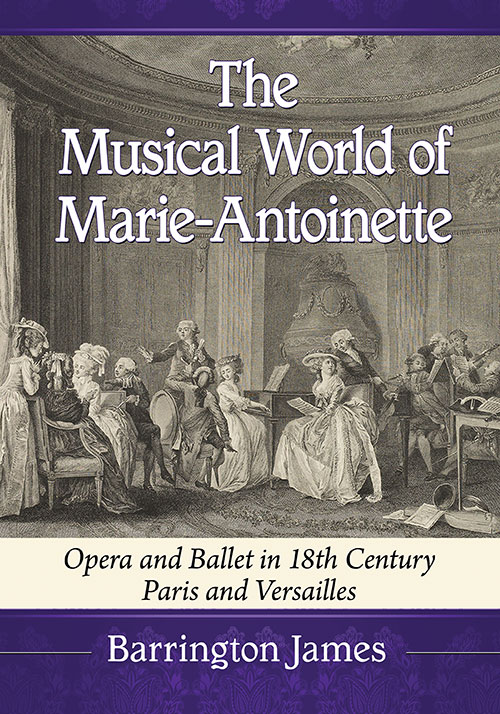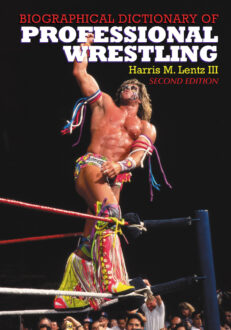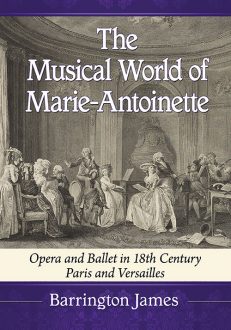The Musical World of Marie-Antoinette
Opera and Ballet in 18th Century Paris and Versailles
$49.95
In stock
About the Book
For decades, eighteenth-century Paris had been declining into a baroque backwater. Spectacles at the opera, once considered fit for a king, had become “hell for the ears,” wrote playwright Carlos Goldoni. Then, in 1774, with the crowning of Louis XVI and Marie-Antoinette, Paris became one of the world’s most vibrant musical centers.
Austrian composer Christophe-Willibald Gluck, protégé of the queen, introduced a new kind of tragic opera—dramatic, human and closer to nature. The expressive pantomime known as ballet d’action, forerunner of the modern ballet, replaced stately court dancing. Along the boulevards, people whistled lighter tunes from the Italian opera, where the queen’s favorite composer, André Modeste Grétry, ruled supreme.
This book recounts Gluck’s remaking of the grand operatic tragedy—long symbolic of absolute monarchy—and the vehement quarrels between those who embraced reform and those who preferred familiar baroque tunes or the sweeter melodies of Italy. The turmoil was an important element in the ferment that led to the French Revolution and the beheading of the queen.
About the Author(s)
Bibliographic Details
Barrington James
Format: softcover (7 x 10)
Pages: 266
Bibliographic Info: 23 photos, notes, bibliography, index
Copyright Date: 2021
pISBN: 978-1-4766-8436-9
eISBN: 978-1-4766-4202-4
Imprint: McFarland
Table of Contents
Preface 1
A Note on Sources 2
1. A Country Ripe for Change 5
A Surprise Meeting 7 • The Harp 9 • Music Takes Over 10 • The Petit Trianon 11 • The Trianon Theater 13
2. Christoph Willibald Gluck and the Quest for Drama 16
French Influence in Vienna 16 • Reform Operas 17 • Calzabigi 18 • Ideas of Paris 19 • Du Roullet 20 • A Bold Enterprise 21 • Stormy Rehearsals 22 • A Letter from Rousseau 23 • This Happy Revolution 24 • A New Part for the Goddess 25 • Orphée et Eurydice 26
3. “Simplicity, Truth, and Naturalness” 28
Alceste 28 • Armide 28 • Dramatic Impact 29 • Painter, Poet and Musician 30 • A Terrible Battle 32 • La Harpe’s Attack 32 • Anonyme de Vaugirard 33
4. The Baroness and the Broken Old Songbird 35
Two Divas 35 • A Fight with a Prince 36 • The Voice of the People 37 • Brutal Hostility 38 • Madame la Baronne 40 • Arnould Attempts a Comeback 41
5. Niccolò Piccinni 43
In Search of a Fortune 43 • Du Barry’s Rivalry 44 • Is There No Sun? 46 • Orlando and Orlandino 48
6. Iphigénie en Champagne 51
Atys 51 • An Operatic Duel 52 • The Drunken Soprano 54 • A Convivial Dinner 57
7. A Star Is Born: Madame Saint-Huberty 59
Didon 59 • An Unfortunate Marriage 60 • Didon Transformed 61 • Authentic Costume 63 • Quarrels with Management 64 • Piccinni Returns to Naples 65
8. Mozart 66
The Duc de Guînes 66 • A Warning 67 • From Child Prodigy to Nobody 68 • From Mannheim to Paris 69 • Baron von Grimm 73 • Aristocrats 74 • Slow Return to Salzburg 75
9. Antonio Salieri 78
Écho et Narcisse 78 • Les Danaïdes 80 • Salieri’s Deception 82 • Les Horaces 83
10. Tragédie Lyrique 85
In Search of a Common Language 85 • Italy versus France 85 • Lully 86 • Rameau 87 • Scribblers 89 • The Buffoons 89 • Religious Undertone 90 • Rousseau 91 • Le devin du village 93 • A Hell for the Ears 95 • The French Howl 96 • Why Was the Paris Opéra So Different? 97
11. The Entrepreneur 99
The Performing Monkey Pays 99 • De Vismes du Valgay 100 • Expanding the Repertoire 101 • A Fresh Start 102 • Castor et Pollux 104 • Les Bouffons, Bis 104 • A Modern Impresario 106 • The Opéra Conspiracy 106 • De Vismes’ Denial 109
12. Ballet and the Art of Gesture 110
Dupré’s Graceful Steps 110 • Ballets within Operas 111 • Pantomime 111 • Gluck and Ballet 112 • Noverre 113 • Enormous Ill Will 115
13. Marie-Madeleine Guimard 117
Mirza et Lindor 117 • Extravagance 119 • A Favorite at Court 120 • Ballet and Meaning 121 • Nature 122 • Grace 123
14. Concerts 124
Concert Life 124 • Aristocrats 126 • Foreigners 126 • Baron Bach 127 • The Concert Spirituel 127 • Gossec and the Concert des Amateurs 128 • L’Orchestre de la Société Olympique 130 • The Court 131 • Menus Plaisirs 131
15. Opéra Comique 133
The Italian Theater 133 • Jean Monnet 133 • Financial Crisis 135 • The Merged Company 137 • An Italian Innovator 138 • Monsigny 138 • Philidor 140 • Nicolas-Marie d’Alayrac 142
16. Marguerite Montansier 144
Into the Queen’s Circle 144 • The Theater at Versailles 145 • Paisiello 147 • Montansier’s Role 147 • Move to Paris 148 • Théâtre de Monsieur 150
17. André-Modeste Grétry 152
The Queen’s Music Director 152 • Grétry Walks to Rome 153 • A Meeting with Voltaire 154 • Hostile Reception in Paris 155 • Marmontel Comes to the Rescue 156 • Opus One 157 • Zémire et Azor 158 • Michel-Jean Sedaine 160 • Tragedies 161
18. Jean-Nicolas Bouilly 163
Pierre le Grand 163 • Antoinette 163 • Grétry’s Great Loss 164 • Grétry Quits Music 166 • Revolutionary Politics 167 • Fidelio 168
19. The Opéra in the 1780s 169
Fire, Again! 169 • A Race to Rebuild 171 • Safety Concerns 172 • Antoine Dauvergne 172 • The Stars Run Away 174 • Mlle. Théodore 175 • Undisputed Talent 176 • Dauberval Flees to London 177
20. Antonio Sacchini 179
L’Olympiade 179 • Xenophobia at the Opéra 180 • Renaud 181 • Chimène 182 • Dardanus 183 • Œdipe à Colone 184 • Arvire et Évélina 186
21. Figaro and Tarare 187
The Marriage of Figaro 187 • The Necklace Affair 187 • The End Game 188 • A Wave of Slander 189 • Tarare 190 • An Oriental Theme 192
22. The Show Goes On 194
Resentment of Bureaucracy 194 • Dauvergne Reappointed 195 • A School for Principals 197 • Les Filles de l’Opéra 197 • The Show Goes On 198 • Tu dors Brutus 199
23. Religion and Revolution 202
The Grand Motet 202 • Jean-François Lesueur 203 • Gossec and the Big Sound 204 • François Giroust 205 • A New Religion 207 • A Revolution in Song 209 • La Marseillaise 211 • Dialogue des Carmélites 213
24. Tragic Epilogue 214
A Fateful Aria 214 • Censorship 216 • Farewell to the Theater 216 • The Temple 218
Chapter Notes 221
Bibliography 241
Index 253






